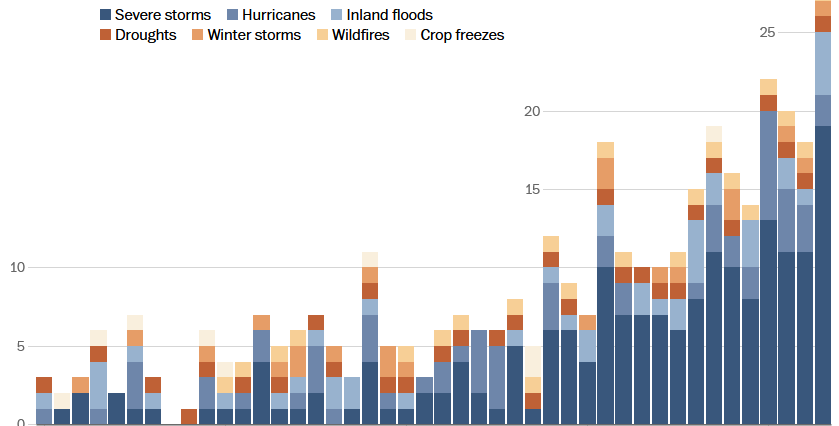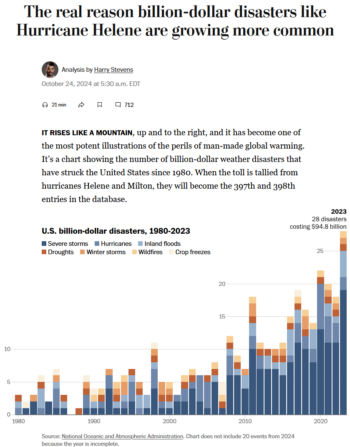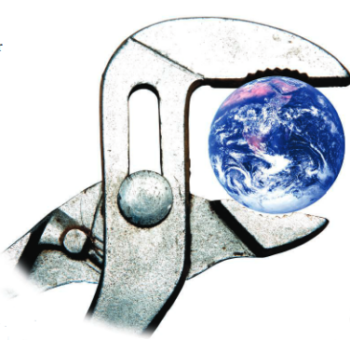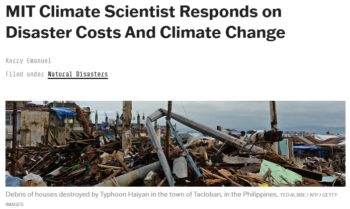WaPo Says Not to Worry About Climate Disruption's Disastrous Costs:
Julie Hollar


The Washington Post (10/24/24) claims that "the rise in billion-dollar disasters, while alarming, is not so much an indicator of climate change as a reflection of societal growth and risky development."
As the country begins to vote in an election that will be hugely consequential for the climate crisis, the central task of news outlets' climate beats should be informing potential voters of those consequences. Instead, the Washington Post's "Climate Lab" seems to be working hard to cast doubt on whether climate change is really causing weather disasters to be more expensive.
In a lengthy piece (10/24/24) headlined "The Real Reason Billion-Dollar Disasters Like Hurricane Helene Are Growing More Common," Post Climate Lab columnist Harry Stevens highlighted a NOAA chart depicting a notable increase in billion-dollar weather disasters hitting the US that he says is widely used by government reports and officials "to help make the case for climate policies." But, in fact, Stevens tells readers:
The truth lies elsewhere: Over time, migration to hazard-prone areas has increased, putting more people and property in harm’s way. Disasters are more expensive because there is more to destroy.
The takeaway is clear: The (Democratic) government is lying to you about the supposedly devastating impacts of climate change.
Distorting with cherry-picked data
The problem is, it's Stevens' story that's doing the misleading. It relies heavily on the work of one source, Roger Pielke Jr., a longtime climate contrarian beloved by climate denial right-wingers, who cherry-picks data to distort the truth.
What's worse, from a media critic's perspective, is that it's not even a new story; it's been debunked multiple times over the years. Pielke—a political scientist, not a climate scientist, which Stevens never makes clear—has been promoting this tale since 1998, when he first published a journal article that purported to show that, as Stevens describes, "after adjusting damage to account for the growth in people and property, the trend [of increasing economic costs from weather disasters] disappears."

A review of Roger Pielke's book The Climate Fix in the journal Science (11/26/10) accused him of writing "a diatribe against the IPCC and other scientists that is based on highly selective and distorted figures and his own studies."
When Pielke published the argument in his 2010 book, the journal Science (11/26/10) published a withering response, describing the chapter as "a diatribe against the IPCC and other scientists that is based on highly selective and distorted figures and his own studies." It detailed the multiple methodological problems with Pielke's argument:
He makes “corrections” for some things (notably, more people putting themselves in harm’s way) but not others. Some adjustments, such as for hurricane losses for the early 20th century, in which the dollar value goes up several hundred–fold, are highly flawed. But he then uses this record to suggest that the resulting absence of trends in damage costs represents the lack of evidence of a climate component. His record fails to consider all tropical storms and instead focuses only on the rare land-falling ones, which cause highly variable damage depending on where they hit. He completely ignores the benefits from improvements in hurricane warning times, changes in building codes, and other factors that have been important in reducing losses. Nor does he give any consideration to our understanding of the physics of hurricanes and evidence for changes such as the 2005 season, which broke records in so many ways.
Similarly, in discussing floods, Pielke fails to acknowledge that many governing bodies (especially local councils) and government agencies (such as the US Army Corps of Engineers) have tackled the mission of preventing floods by building infrastructure. Thus even though heavy rains have increased disproportionately in many places around the world (thereby increasing the risk of floods), the inundations may have been avoided. In developing countries, however, such flooding has been realized, as seen for instance this year in Pakistan, China and India. Other tenuous claims abound, and Pielke cherry-picks points to fit his arguments.
That year, climate expert Joe Romm (Climate Progress, 2/28/10) called Pielke "the single most disputed and debunked person in the entire realm of people who publish regularly on disasters and climate change."
Debunked a decade ago

In response to Pielke, climate scientist Kerry Emanuel (538, 3/31/14) pointed out that it’s not necessarily appropriate to normalize damages by gross domestic product (GDP) if the intent is to detect an underlying climate trend," since "GDP increase does not translate in any obvious way to damage increase," as "wealthier countries can better afford to build stronger structures and to protect assets."
Pielke peddled the story in 538 (3/19/14) four years later—and lost his briefly held job as a contributor for it, after the scientific community spoke out against it in droves, as not being supported by the evidence.
The backlash led 538 to give MIT climate scientist Kerry Emanuel (3/31/14) a column to rebut Pielke, in which she explained that while it's of course true that "changing demographics" have impacted the economic costs of weather disasters, Pielke's data didn't support his assertion "that climate change has played no role in the observed increase in damages." She pointed to the same kinds of methodological flaws that Science did, noting that her own research with Yale economist Robert Mendelsohn projected that through the year 2100, "global hurricane damage will about double owing to demographic trends, and double again because of climate change."
That all happened ten years ago. So why is Pielke's same old ax-grinding getting a platform at the Washington Post shortly before Election Day?
Stevens does tell readers—quite far down in the article—that Pielke has "clashed with other scientists, journalists and government officials" over his research—though Stevens doesn't give any details about those clashes, or about Pielke's reputation among climate scientists more generally.
Stevens also briefly notes that Pielke was recently hired by the American Enterprise Institute, which Stevens characterizes as "center-right," but more helpfully might have characterized as "taking millions from ExxonMobil since 1998." But in the same paragraph, Stevens also takes pains to point out that Pielke says he's planning to vote for Harris, as if to burnish Pielke's climate-believer bonafides.
Pielke agrees with Pielke

Roger Pielke "agrees with studies that agree with Pielke" (Environmental Hazards, 10/12/20).
Stevens tells Post readers that the science is firmly on Pielke's side:
Similar studies have failed to find global warming’s fingerprint in economic damage from hurricanes, floods, tornadoes and crop losses. Of 53 peer-reviewed studies that assess economic damage from weather events, 52 could not attribute damage trends to global warming, according to Pielke’s 2020 review of the literature, the most recent and comprehensive.
You'll notice Stevens just used Pielke's own review to bolster Pielke's argument. But the journal that published that review (Environmental Hazards, 8/5/20) immediately followed up with the publication of a critique (10/12/20) from researchers who came to the opposite conclusion in their study on US hurricanes. They explained that there are "fundamental shortcomings in this literature," which comes from a disaster research "field that is currently dominated by a small group of authors" who mostly use the same methodology—adjusting historical economic losses based strictly on "growth in wealth and population"—that Pielke does.
The authors, who wrote a study that actually accounted for this problem and did find that economic losses from hurricanes increased over time after accounting for increases in wealth and population, point out that Pielke dismissed their study and two others that didn't agree with his own results essentially because they didn't come to the same conclusions. As the authors of the critique write drily: "Pielke agrees with studies that agree with Pielke."
A phony 'consensus'
Stevens includes in his article an obligatory line that experts say
disputing whether global warming’s influence can be found in the disaster data is not the same as questioning whether climate change is real or whether society should switch from fossil fuels.
He also adds that
many scientists say that global warming has intensified hurricanes, wildfires, droughts and other extreme weather, which must be leading to greater economic losses.
Note that he frames it as only "many," and suggests they are only using (faulty, simplistic) logic, not science. But of course, climate change is intensifying extreme weather, as even Stevens has reported as fact recently (in the link he provides in that passage). In contrast, Stevens writes that
the consensus among disaster researchers is that the rise in billion-dollar disasters, while alarming, is not so much an indicator of climate change as a reflection of societal growth and risky development.
But in fact, as mentioned above, there's not consensus even among disaster researchers (who are primarily economists). And the "many scientists" who disagree with Pielke aren't the scientists the Post chooses to focus on. While Stevens quotes a number of different experts, including some who disagree with Pielke, they are not given anywhere near the space—or credence—Pielke and his arguments are. (Pielke's name appears 15 times across the article and its captions.)
When he does get around to quoting some of the scientists, like MIT's Emanuel, whose research shows that extreme weather events are intensifying, Stevens presents the conflicting conclusions as a back-and-forth of claims and counterclaims, giving the last word in that debate to a disaster researcher whose goal is to refocus blame for disasters on political decisions—like supporting building in vulnerable locations—rather than climate change.
Changes in our built environment, and governments' impact on those changes, are certainly an important subject when it comes to accounting for and preventing billion-dollar disasters—which virtually no one disputes. (Indeed, the four government reports Stevens links to in his second paragraph as supposedly misusing the NOAA data explicitly name some variation of "increased building and population growth" as a contributing factor to growing costs.) It's simply not an either/or question, as the Post's teaser framed it: "Many blame global warming. Others say disasters are more expensive because there is more to destroy." So it's bizarre and frankly dangerous that ten years after climate scientists debunked Pielke's claim that there's no evidence climate change is increasing extreme weather costs, Stevens would take, as the "urgent" question of the moment, "Is global warming to blame" for the growing billion-dollar disaster tally?
By giving the impression that the whole thing is basically a government scam to justify climate policies, Stevens' direct implication is that even if climate change is indisputable, it doesn't really matter. And it feeds into climate deniers' claims that the climate change-believing government is lying about climate change and its impacts, at a time when a large number of those deniers are seeking office.
ACTION ALERT: You can send a message to the Washington Post at [email protected].
Please remember that respectful communication is the most effective. Feel free to leave a copy of your message in the comments thread here.
|
